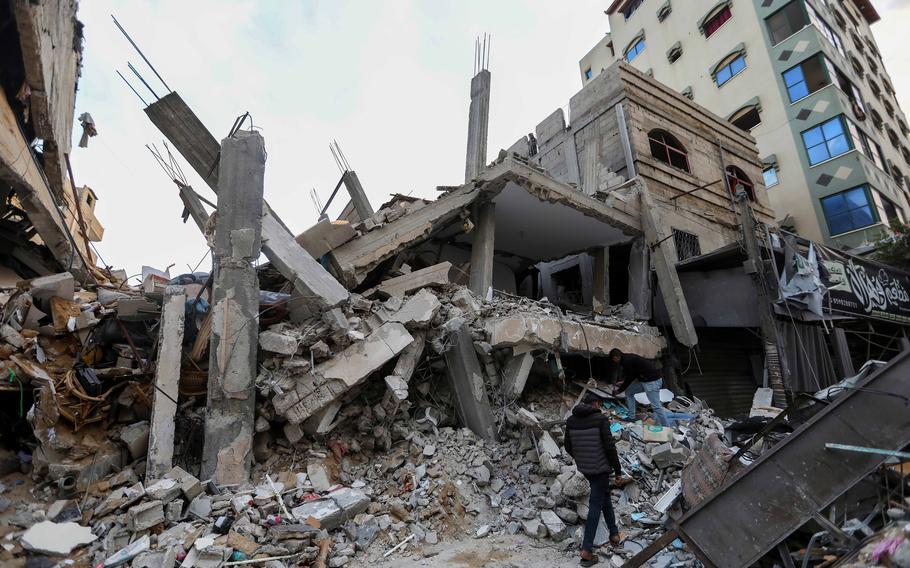
People inspect damage and recover items from their homes following Israeli airstrikes on March 4, 2024 in Rafah, Gaza. Israel’s military is pressing ahead with its operations against Hamas in Rafah despite a ruling from the International Court of Justice ordering it to halt such activity in the name of sparing civilians. (Ahmad Hasaballah, Getty Images/TNS)
(Tribune News Service) — Israel’s military is pressing ahead with its operations against Hamas in the southern Gaza city of Rafah despite a ruling from the International Court of Justice ordering it to halt such activity in the name of sparing civilians.
Officials in Israel say they interpret Friday’s ruling in The Hague as permitting the incursion to continue as long as it’s done with care, adding that the military is carrying out targeted strikes in Rafah, far short of a full invasion.
At the same time, negotiations over a Gaza cease-fire seem set to resume this week following a meeting in Paris among Israel’s intelligence chief, the head of the U.S. Central Intelligence Agency, and the Qatari foreign minister.
The talks, aimed at exchanging Israeli hostages for Palestinian prisoners and reaching an extended pause in combat, have fallen apart over Hamas’ insistence that they lead to an end to the war. Israel says the war can only end with the defeat of Hamas. The mediators are seeking language that both sides can accept.
In a ruling on Friday, the ICJ said that “Israel must immediately halt its military offensive, and any other action in the Rafah Governorate, which may inflict on the Palestinian group in Gaza conditions of life that could bring about its physical destruction in whole or in part.”
The wording of the sentence has led to diverging interpretations. Many regard it as as an order to stop the offensive, and that’s how it was widely reported on Friday. But Israeli officials say the order is conditional — that their military must stop any action which could destroy civilians.
The campaign in Rafah will not “lead to the destruction of the Palestinian civilian population,” Israel’s National Security Adviser Tzachi Hanegbi said in a joint statement with the Foreign Ministry’s legal advisers. Speaking later on Israel’s Channel 12, Hanegbi said, “What they are asking us is to not commit genocide in Rafah. We did not commit genocide and we will not commit genocide.”
Some liberal legal scholars in Israel agree.
“The ICJ didn’t prohibit all Israeli operations in Rafah,” said Mordechai Kremnitzer, a specialist in international law at Hebrew University in Jerusalem and the Israel Democracy Institute. “Israel was ordered to avoid operations that inflict harm on the Palestinian population in Gaza and avoid conditions that could bring about its physical destruction.”
He added that his interpretation is bolstered by the fact that the court didn’t order Hamas to release hostages and stop firing missiles at Israel, and it’s not reasonable that the court is ordering one side to stop but not the other.
Sirens sounded around Tel Aviv on Sunday, driving residents into bomb shelters after eight missiles were shot from Rafah, according to the military. Hamas claimed responsibility. Israel’s air defense system intercepted them all.
It was the first such volley of missiles to reach Tel Aviv in months, a sign, military spokesmen said, that Hamas has been smuggling new weapons into Rafah from Egypt — a key reason Israel contends it needs to send its forces there.
Whatever the majority meant in their 13-2 ruling, member countries can take their case to the United Nations Security Council, which could order Israel to stop its military incursion into Rafah at risk of sanctions.
To avoid that, Israel would rely on the U.S. veto in the Security Council. Given recent tensions between Prime Minister Benjamin Netanyahu and President Joe Biden, there’s concern in Jerusalem that Washington may not rush to its aid, although it seems likely to issue a veto in the end.
The tension with the U.S., which has built over the course of the seven-month war in Gaza, has intensified over Rafah. Some 1.4 million Palestinians were sheltering in Rafah when Israel said they should move to safer areas within the coastal enclave in preparation for its invasion, which is aimed at taking out what it says are the four remaining Hamas battalions there.
The U.S. said there’s no safe place for those internal refugees to go and that the flow of badly needed humanitarian goods into Gaza would again be halted if the Rafah operation went ahead.
Nearly a million Palestinians have indeed fled Rafah to parts of Gaza that are at least partly destroyed, many without proper sanitation or water supplies.
David Satterfield, a senior adviser for Gaza to the U.S. State Department, said that as a result of the Rafah operation, a humanitarian crisis that was slowing down is again at risk of spinning out of control.
Among the problems has been the stoppage of aid from Egypt since the Rafah operation began. On Sunday, some of that aid was starting to enter Gaza through Israel’s Kerem Shalom crossing, according to an Israeli military spokesman.
The war began on Oct. 7 after thousands of Hamas operatives crossed into southern Israel, killing 1,200 and abducting 250 more. Israel’s counterattack has killed some 35,000 Gazans, according to Hamas officials who don’t distinguish between civilians and fighters. The U.S. and European Union consider Hamas a terrorist organization.
©2024 Bloomberg L.P.
Visit bloomberg.com.
Distributed by Tribune Content Agency, LLC.